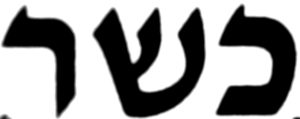Like almost every other question about Judaism, the answer to this question depends very much on who you ask, and who is doing the asking.’
Kosher regulations
The kosher regulations as given in the Torah (the Old Testament)are quite vague. While they do mention certain practices as being unacceptable (i.e. cooking a calf in the milk of its mother), and list by name many types of animals that are not allowed to be eaten, the great bulk of practical detail involved in the whole process is derived from later rabbinic commentators and is based on derivations done on the Torah by those Rabbis that came later, as recorded in the Talmud, a huge work of Jewish legal wisdom. For example, the Torah mentions not cooking a calf in its mother’s milk, and the rabbis interpreted that to mean not just literally, but no meat should ever be cooked in any milk. Later rabbi’s added to that, prohibiting even chicken from being cooked with milk, while later yet they added the prohibition of even eating meat and milk together, even when not cooked together. Today, most observant Jews will wait a significant time between the consumption of any meat and any milk product, the time-varying with family custom but most commonly six hours.
The Rules for fish
The rules for fish are fairly simple: if it has fins and scales, it’s kosher. If it doesn’t, it’s not. Ergo, all shrimp, crab, lobster, clams, etc. are non-kosher. The alleged reason for the popularity of Chinese cuisine in Jewish neighborhoods is allegedly the belief that if shrimp is chopped really fine, it’s okay, but that isn’t really true.
 For fowl it’s trickier because the Torah doesn’t really give any rules, rather it lists them by name. However, being the names are given in ancient Hebrew and several thousand years have passed, we cannot really be sure what the names actually mean, and therefore the only fowl accepted as kosher are those that there is a tradition passed down on, and basically limiting the choices to chicken and other very common birds, and eliminating anything exotic.
For fowl it’s trickier because the Torah doesn’t really give any rules, rather it lists them by name. However, being the names are given in ancient Hebrew and several thousand years have passed, we cannot really be sure what the names actually mean, and therefore the only fowl accepted as kosher are those that there is a tradition passed down on, and basically limiting the choices to chicken and other very common birds, and eliminating anything exotic.
In addition to the ingredients, the slaughtering process needs to be done in the fast and humane way prescribed by the rabbi’s, and the preparation must be done using only kosher pots (i.e. pots never used for non-kosher) and kosher ingredients (i.e., no animal fats from on-kosher animals).
With all that background, it’s still hard to answer the question, because we have only talked about what is kosher, not about the people eating it.
Orthodox Jews generally adhere very strictly to all the above, while everyone else is on a sliding scale. Reform Jews, in general, do not observe any of the kosher rules. Conservatives often observe them, but only a home. There are some that will eat only kosher foods at non-kosher restaurants, for instance eating fish at a non-kosher place even though most orthodox would reject that for fear that some non-kosher oil may have been used, or perhaps a non-kosher meat dish may have splashed some sauce on it.
Kosher Supervision Symbols Check
Many Jews check packages of food for the kosher supervision symbols, while the less stringent just read the ingredients for lard or the like.
 The bottom line of the whole thing is, that there’s a reason that Jews are often accused of being opinionated! There are hundreds of permutations of observance, and to really know them all requires long intense study. In fact, the major part of the study required for Orthodox rabbinic ordination is the study of the kosher laws.
The bottom line of the whole thing is, that there’s a reason that Jews are often accused of being opinionated! There are hundreds of permutations of observance, and to really know them all requires long intense study. In fact, the major part of the study required for Orthodox rabbinic ordination is the study of the kosher laws.
In the event, you are reading this to know how to serve a friend or relative that keeps kosher, be aware that there really is no way to do it without talking to them to determine their standards. If you are considering becoming observant of the kosher laws, be aware that you really need to get a reading list from a rabbi, because it is far too complex to pick up online in a short article!






